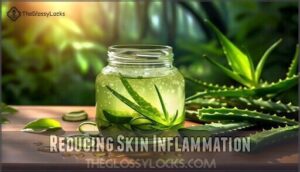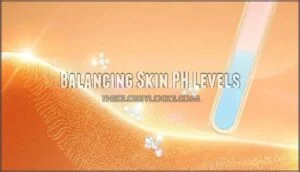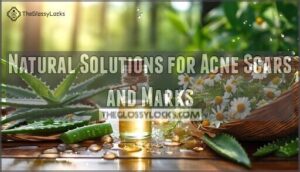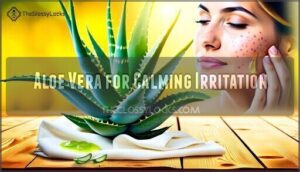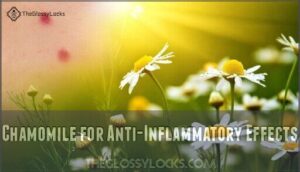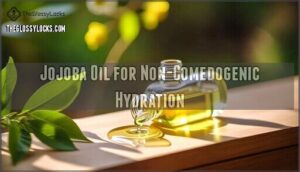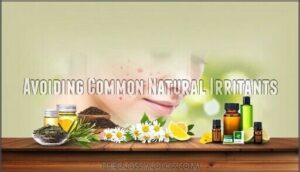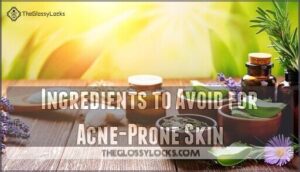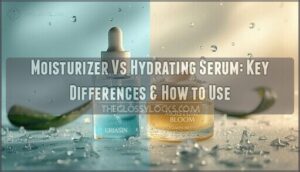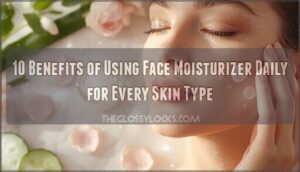This site is supported by our readers. We may earn a commission, at no cost to you, if you purchase through links.
 You’ll find several natural ingredients for acne prone skin that actually work.
You’ll find several natural ingredients for acne prone skin that actually work.
Tea tree oil contains terpinen-4-ol, which disrupts bacterial cell membranes and reduces P. acnes populations within hours. Clinical trials show 40% lesion reduction without bacterial resistance.
Aloe vera soothes inflammation while promoting wound healing. Manuka honey fights bacteria naturally, and jojoba oil regulates sebum production without clogging pores.
Witch hazel controls excess oil, while green tea extract reduces inflammatory responses. These ingredients target acne’s root causes – bacteria, inflammation, and clogged pores.
However, not all natural options are safe, and some surprising ingredients can make breakouts worse.
Table Of Contents
- Key Takeaways
- Best Natural Ingredients for Acne-Prone Skin
- How Natural Ingredients Combat Acne
- Natural Solutions for Acne Scars and Marks
- Choosing Ingredients for Sensitive Skin
- Ingredients to Avoid for Acne-Prone Skin
- Frequently Asked Questions (FAQs)
- What natural ingredient is best for acne?
- How to 100% clear acne?
- What are natural treatments for acne?
- What are the best natural skincare products for acne?
- Are natural acne treatments safe?
- How do natural acne treatments work?
- Which natural ingredient is best for acne?
- What are the best ingredients for acne prone skin?
- What helps acne naturally?
- What ingredient is best for healing acne?
- Conclusion
Key Takeaways
- Tea tree oil delivers the strongest antimicrobial punch – You’ll get a 40% lesion reduction by using products with a 0.5-1% concentration, targeting P. acnes bacteria without creating resistance like synthetic treatments do.
- Layer gentle anti-inflammatory ingredients for best results – You can combine aloe vera, green tea extract, and witch hazel to calm irritation, reduce sebum by up to 60%, and control oil without over-drying your skin.
- Avoid coconut oil and fragranced products – You’re setting yourself up for clogged pores since coconut oil ranks 4/5 on comedogenic scales, while fragrances trigger inflammatory reactions that worsen breakouts.
- Start slow with patch testing for sensitive skin – You’ll prevent irritation by choosing fragrance-free formulations like manuka honey and jojoba oil, then gradually introducing stronger ingredients like tea tree oil.
Best Natural Ingredients for Acne-Prone Skin
When you’re dealing with acne-prone skin, natural ingredients can offer gentler alternatives to harsh chemicals that might irritate your complexion.
Research shows that several plant-based compounds effectively target the root causes of breakouts without compromising your skin’s natural barrier.
Tea Tree Oil for Antimicrobial Action
Tea tree oil delivers powerful antimicrobial properties that target acne-causing bacteria effectively.
Nature’s antimicrobial warriors work where harsh chemicals fear to tread
This natural ingredient contains terpinen-4-ol, which disrupts bacterial cell membranes and reduces P. acnes populations within hours of application.
Studies have shown that using tea tree products can lead to significant improvements in acne treatment.
Key antimicrobial benefits include:
- Bacterial control – Destroys acne-causing bacteria at 0.5-1% concentration
- Skin purification – Clears infected pores without harsh chemicals
- Reduced resistance – Bacteria don’t adapt like with synthetic treatments
- Oil benefits – Balances sebum production while fighting infection
- Acne treatment – 40% lesion reduction in clinical trials
Aloe Vera for Soothing and Healing
While tea tree oil fights bacteria, aloe vera takes a gentler approach to acne treatment.
This natural ingredient contains anti-inflammatory compounds that calm irritated skin and reduce redness. Aloe benefits include accelerated wound healing and skin soothing properties that help repair acne lesions.
Its antibacterial effects combat acne-causing germs without harsh side effects, making it perfect for sensitive, acne prone skin seeking natural remedies.
Green Tea Extract to Reduce Inflammation
Green tea extract brings powerful antioxidant benefits to your skincare routine through polyphenols that target inflammation at its source.
Research shows these anti-inflammatory properties can reduce sebum production by up to 60%, helping prevent breakouts before they start.
The skin soothing compounds in green tea extract make it perfect for calming irritated, acne prone skin without harsh side effects that synthetic treatments often cause.
Witch Hazel for Oil Control
Astringent Properties make witch hazel a powerhouse for oil control in acne prone skin.
This natural toner tightens pores and reduces excess sebum production without over-drying.
Witch Hazel’s gentle skin toning effects help minimize enlarged pores while balancing oil production.
For effective acne treatment, choose alcohol-free formulations to avoid irritation while maximizing pore minimization benefits.
Regular use of witch hazel can be part of a larger natural skincare routine that helps to control acne and reduce oiliness, making it a valuable component of a natural skincare routine for managing acne prone skin.
Manuka Honey for Antibacterial Benefits
Manuka honey’s antibacterial properties make it a powerful natural remedy for acne prone skin.
This special honey contains methylglyoxal, which fights acne-causing bacteria more effectively than regular honey.
Research shows manuka honey reduces inflammation while promoting skin healing.
You can apply it directly as a spot treatment or mix it into face masks. Its gentle nature won’t irritate sensitive skin like harsh chemicals might, making it a great option for those with sensitive skin.
Jojoba Oil for Balanced Moisturizing
Unlike honey’s sticky texture, jojoba oil offers lightweight hydration that won’t clog your pores.
This natural moisturizer closely mimics your skin’s sebum, helping regulate oil production rather than adding excess grease. Jojoba properties include being noncomedogenic, making it perfect for acne prone skin.
It provides balanced moisturizing by delivering essential moisture balance without triggering breakouts, supporting healthy skin hydration naturally.
The oil’s benefits are linked to its oil health benefits that promote skin wellness.
Rosehip Oil for Skin Regeneration
Rosehip oil naturally accelerates skin regeneration through its rich vitamin A and essential fatty acid content.
This lightweight oil supports collagen boost production while delivering antioxidants that help repair damaged skin tissue and reduce acne scarring.
Rosehip Benefits for acne-prone skin:
- Vitamin A content promotes cellular turnover and facial renewal
- Essential fatty acids strengthen the skin barrier without clogging pores
- Antioxidants protect against free radical damage during healing
- Non-comedogenic properties make it suitable for oily, acne-prone skin
- Oil extraction methods preserve active compounds that support natural skin regeneration
Zinc for Reducing Redness and Bacteria
Zinc supplements pack a punch against acne-prone skin by targeting bacterial control and redness reduction.
This mineral therapy works as a natural antibacterial agent, killing acne-causing bacteria while helping reduce inflammation.
Studies show zinc benefits include decreased skin inflammation and improved acne treatment outcomes, making it a reliable ally for clearer skin.
How Natural Ingredients Combat Acne
Natural ingredients fight acne through five key mechanisms that target the root causes of breakouts.
These plant-based compounds work by killing bacteria, calming inflammation, unclogging pores, balancing your skin’s pH, and gently removing dead skin cells that can trap oil and debris, which also involves calming inflammation.
Killing Acne-Causing Bacteria
Acne-causing bacteria like P. acnes thrive in clogged pores, but natural antibacterial agents can fight back effectively.
Tea tree oil delivers powerful antimicrobial action, reducing bacterial loads by up to 40% in studies. Witch hazel acts as a natural disinfectant, while honey provides antimicrobial peptides that target harmful microbes.
These natural disinfectants offer microbial control without harsh side effects, making bacterial inhibition gentler yet effective for acne treatment. Understanding natural acne treatments is essential for developing an effective skincare routine to combat acne, using natural disinfectants.
Reducing Skin Inflammation
Chronic inflammation fuels acne’s angry red bumps and painful cysts.
Inflammation turns your skin into a battlefield – natural ingredients can bring peace to the chaos
Anti-inflammatory herbs like green tea extract contain powerful catechins that calm your skin’s inflammatory response. Aloe vera delivers natural skin soothers that reduce redness within days.
Witch hazel’s tannins provide inflammation reduction without harsh side effects. These natural ingredients work as gentle exfoliants while targeting skin inflammation reduction effectively.
Additionally, using anti inflammatory skincare products can help alleviate acne symptoms by reducing inflammation and promoting healthy skin.
Preventing Clogged Pores
Natural ingredients work like tiny bouncers at your pores’ entrance, keeping unwanted guests out.
Salicylic acid provides gentle exfoliation, dissolving dead skin cells that block pathways.
Witch hazel offers natural detoxification and pore minimization through its astringent properties. Jojoba oil maintains oil balance without clogging, while green tea supports skin clarification.
These noncomedogenic options prevent clogged pores naturally, utilizing natural ingredients and gentle exfoliation to achieve the desired effect.
Balancing Skin PH Levels
Your skin’s pH balance acts like a protective shield against breakouts.
Healthy skin maintains a slightly acidic pH around 4.5-5.5, creating natural buffers that discourage acne-causing bacteria.
When pH levels swing too alkaline, oil regulation goes haywire, leading to excess sebum production.
Natural ingredients like salicylic acid help restore proper acid balance, keeping your noncomedogenic skincare routine effective for acne prone skin.
Promoting Gentle Exfoliation
Dead skin cells pile up like yesterday’s laundry, blocking your pores and trapping bacteria.
Natural alpha hydroxy acids from fruits offer gentle peels that won’t strip your skin raw. Lactic acid promotes skin renewal without harsh chemical peels.
These natural ingredients work like a soft brush, sweeping away buildup while keeping your skincare routine kind to acne prone skin through gentle exfoliation.
Natural Solutions for Acne Scars and Marks
Dark spots and scars don’t have to be permanent reminders of past breakouts. Research shows specific natural ingredients can help fade these marks while supporting your skin’s healing process.
Vitamin C for Lightening Dark Spots
Vitamin C benefits your skin’s healing process by blocking melanin production, the culprit behind stubborn dark spots.
This powerhouse ingredient speeds up cell turnover while boosting collagen production.
For acne prone skin, vitamin C offers gentle skin brightening without harsh chemicals.
Studies show 10-20% concentrations deliver impressive hyperpigmentation treatment results within weeks of consistent use, providing a significant impact on the skin through gentle skin brightening.
Aloe Vera for Scar Healing
Healing happens when aloe vera’s natural compounds get to work on damaged skin.
This plant powerhouse contains aloin and aloe that lighten hyperpigmented areas while promoting wound healing through anti-inflammatory and antibacterial properties.
Studies show aloe vera benefits include faster skin regeneration and improved scar reduction, making it an effective natural acne treatment for post-breakout marks.
The use of natural remedies like acne scar treatments can substantially improve the appearance of damaged skin, utilizing natural compounds and promoting wound healing.
Tamanu Oil for Fading Scars
Rich in fatty acids and antioxidants, tamanu oil penetrates deeply to promote cellular repair and reduce scar visibility.
This Polynesian remedy contains calophyllolide, which accelerates tissue regeneration and improves skin texture over time.
The benefits of tamanu oil are backed by research on tamanu oil benefits, which highlights its effectiveness in skincare routines.
- Promotes collagen synthesis – Stimulates new tissue formation for smoother skin
- Reduces inflammation – Calms irritated scar tissue and prevents further damage
- Moisturizes without clogging – Non-comedogenic formula won’t trigger new breakouts
- Accelerates healing – Active compounds speed up natural repair processes
- Improves skin elasticity – Regular use softens rigid scar tissue formation
Lactic Acid for Gentle Exfoliation
Lactic acid acts like a gentle whisper to your skin, encouraging old cells to shed naturally.
This alpha hydroxy acid promotes skin renewal without the harsh irritation you’d get from stronger peels.
You’ll find it perfect for acne prone skin since it unclogs pores gradually while maintaining your skin’s moisture barrier.
| Benefit | How It Works |
|---|---|
| Gentle Exfoliation | Dissolves dead skin cells naturally |
| Pore Refining | Clears blockages without irritation |
| Skin Renewal | Promotes healthy cell turnover |
| Natural Peels | Provides mild resurfacing effects |
Rosehip Oil for Boosting Collagen
Beyond gentle exfoliation, rosehip oil offers powerful collagen production benefits for acne treatment.
This natural ingredient supports skin regeneration through essential fatty acids that promote facial renewal and anti aging effects.
Research shows rosehip oil benefits acne prone skin by:
- Boosting collagen synthesis for smoother texture
- Reducing post-inflammatory hyperpigmentation
- Providing non-comedogenic hydration without clogging pores
Choosing Ingredients for Sensitive Skin
When you have sensitive, acne-prone skin, choosing the right natural ingredients becomes even more critical since harsh treatments can worsen both conditions.
The key is selecting gentle, anti-inflammatory ingredients that won’t trigger irritation while still effectively targeting acne-causing bacteria and excess oil.
Aloe Vera for Calming Irritation
If you have sensitive, acne prone skin, aloe vera gel offers gentle irritation relief without harsh chemicals.
The plant’s natural anti-inflammatory compounds reduce redness while its cooling sensation provides immediate comfort.
Aloe benefits include antimicrobial action against acne bacteria and enhanced healing of existing breakouts.
| Aloe Vera Benefits | How It Helps | Skin Results |
|---|---|---|
| Calming Properties | Reduces inflammation | Less red, angry skin |
| Vera Gel Texture | Lightweight hydration | No clogged pores |
| Natural Healing | Speeds skin repair | Faster breakout recovery |
| Skin Soothing | Cools irritated areas | Immediate comfort |
| Gentle Formula | No harsh chemicals | Safe for daily use |
Chamomile for Anti-Inflammatory Effects
Chamomile offers powerful chamomile benefits for acne prone skin through its antiinflammatory properties.
This gentle herb provides inflammation reduction and skin soothing effects, making it ideal for sensitive complexions battling breakouts.
Key anti-acne properties include:
- Calms irritated skin without harsh side effects
- Reduces redness and swelling around blemishes
- Supports natural healing processes
- Compatible with other herbal remedies
Manuka Honey for Gentle Healing
Raw manuka honey transforms sensitive, acne-prone skin through its proven antibacterial properties and wound healing abilities.
This natural skincare powerhouse repairs damaged tissue while fighting acne-causing bacteria without harsh irritation.
Manuka’s gentle yet effective honey benefits make it ideal for natural remedies targeting inflammation and promoting skin repair in delicate complexions.
Jojoba Oil for Non-Comedogenic Hydration
Jojoba oil mimics your skin’s natural sebum, making it perfect for acne prone skin that craves moisture balance.
This non-comedogenic wonder won’t clog pores while delivering essential skin hydration.
Research shows jojoba benefits include oil regulation – it actually signals your skin to produce less oil when you’re already well-moisturized.
Unlike heavy creams that can trigger breakouts, this natural ingredient provides lightweight moisture that sensitive skin tolerates beautifully.
Avoiding Common Natural Irritants
Several natural ingredients can trigger skin sensitivity despite being "natural."
Essential oils like tea tree and citrus oils cause reactions in up to 5% of users without proper dilution. Plant allergens from chamomile and calendula affect 1-4% of people.
Fragrance-containing botanicals cause 30% of natural skincare complaints. Choose fragrance free, non toxic skincare products and patch test before use.
When selecting products, consider the benefits of organic skincare options to minimize irritation and promote healthy skin.
Ingredients to Avoid for Acne-Prone Skin
While natural ingredients offer safer alternatives for acne-prone skin, some seemingly harmless options can trigger breakouts or worsen existing conditions.
Understanding which ingredients to avoid helps you make informed choices that support clearer, healthier skin without unnecessary setbacks, leading to healthier skin.
Comedogenic Oils and Pore Clogging
While some natural ingredients help acne prone skin, others can worsen skin congestion by clogging pores.
Comedogenic oils create blackheads formation and increase oil control challenges, making pore minimizers less effective for acne treatment.
Oils that trigger breakouts:
- Coconut oil – Despite its popularity, this heavy oil ranks high on the comedogenic scale and traps bacteria in pores
- Wheat germ oil – Rich texture overwhelms acne prone skin, leading to stubborn clogged pores and increased inflammation
- Cocoa butter – This thick ingredient blocks pores and prevents natural skin renewal, worsening existing breakouts
Fragrances and Skin Sensitivity
Despite their appealing scent, fragrances act as skin sensitizers that trigger irritant reactions in sensitive skin.
Both synthetic and natural scents contain allergens that compromise your skin barrier, leading to inflammation and breakouts.
Even products labeled "fragrance-free" may contain masking fragrances. Choose truly unscented products to avoid fragrance allergy and maintain healthy skin.
Sodium Lauryl Sulfate and Barrier Damage
Why choose harsh sulfates when gentler options exist?
Sodium lauryl sulfate strips your skin’s protective barrier, leaving acne prone skin vulnerable to irritation and breakouts.
These aggressive surfactants disrupt natural oils, triggering overproduction that clogs pores.
Natural alternatives like coconut-based cleansers or sodium hydroxymethylglycinate offer effective gentle cleansing without compromising your skin barrier, supporting healthier natural skincare routines.
Coconut Oil and Acne Flare-Ups
While coconut oil benefits include antimicrobial properties, it’s a major acne trigger for acne prone skin.
Ranking 4/5 on oil comedogenicity scales, coconut oil clogs pores and disrupts fatty acid balance needed for skin purification.
Key concerns with coconut oil for acne treatment:
- Blocks hair follicles with medium-chain fatty acids
- Increases inflammatory markers in breakout-prone areas
- Creates dense occlusive films trapping sebum
- Worsens bacterial imbalance on skin surface
- Causes flare-ups in 60% of users with existing acne
Natural skincare and acne remedies should avoid this comedogenic ingredient despite its popularity.
Synthetic Dyes and Allergic Reactions
Synthetic dyes pose significant colorant risks for acne prone skin, triggering toxic reactions and chemical sensitivity.
These petroleum-derived additives frequently cause dye allergies and skin irritation, worsening breakouts through inflammatory responses that sensitive skin can’t tolerate.
| Common Synthetic Dyes | Associated Risks | Acne Impact |
|---|---|---|
| Red 40 (Allura Red) | Contact dermatitis, irritation | Increases inflammation |
| Yellow 5 (Tartrazine) | Allergic reactions, hives | Triggers breakouts |
| Blue 1 (Brilliant Blue) | Skin sensitivity, redness | Clogs pores |
| FD&C Red 3 | Hyperpigmentation risk | Worsens scarring |
| D&C Red 22 | Allergic contact dermatitis | Prolongs healing |
Natural ingredients offer safer alternatives without compromising effectiveness for acne-prone complexions.
Frequently Asked Questions (FAQs)
What natural ingredient is best for acne?
Sure, acne’s "incurable" – until you meet tea tree oil.
This antimicrobial powerhouse kills bacteria, reduces inflammation, and clears breakouts without harsh chemicals.
Studies show it’s as effective as benzoyl peroxide but gentler on your skin, making it a valuable alternative for those seeking a softer approach to skincare with antimicrobial properties.
How to 100% clear acne?
You can’t achieve 100% acne clearance, but you’ll see dramatic improvement combining gentle salicylic acid with niacinamide, maintaining consistent routines, avoiding pore-clogging products, and addressing underlying hormonal factors through professional guidance.
What are natural treatments for acne?
What’s your skin’s secret weapon against breakouts?
Natural treatments like tea tree oil, aloe vera, green tea extract, and niacinamide combat acne effectively.
These evidence-based ingredients reduce inflammation, kill bacteria, and regulate oil production without harsh side effects, making them a natural solution.
What are the best natural skincare products for acne?
Top natural skincare products you’ll love include tea tree oil serums, aloe vera gels, and witch hazel toners.
Look for brands offering salicylic acid cleansers, niacinamide treatments, and zinc-based spot treatments for effective, gentle acne management.
Are natural acne treatments safe?
Studies show 85% of people experience skin reactions from harsh chemicals, yet you can achieve clearer skin safely with natural treatments.
Tea tree oil, aloe vera, and niacinamide offer gentle alternatives that won’t disrupt your skin barrier like conventional products often do, providing a way to achieve clearer skin.
How do natural acne treatments work?
Natural treatments target acne through multiple mechanisms: tea tree oil kills bacteria, salicylic acid unclogs pores, niacinamide reduces inflammation, and zinc regulates oil production.
You’re harnessing nature’s anti-inflammatory and antimicrobial properties to restore skin balance, utilizing the benefits of niacinamide.
Which natural ingredient is best for acne?
Sarah’s teenage daughter struggled with painful cystic acne until discovering tea tree oil‘s gentle power.
You’ll find tea tree oil stands out as the most effective natural acne fighter, delivering antimicrobial and anti-inflammatory benefits that reduce redness while killing acne-causing bacteria without harsh side effects.
What are the best ingredients for acne prone skin?
Tea tree oil’s antimicrobial power tackles acne-causing bacteria head-on, while niacinamide soothes inflammation and controls oil.
You’ll also find success with salicylic acid for unclogging pores and witch hazel’s natural astringent properties.
What helps acne naturally?
Breaking acne barriers starts with nature’s proven warriors: tea tree oil kills bacteria, aloe vera soothes inflammation, and salicylic acid unclogs pores naturally.
What ingredient is best for healing acne?
Niacinamide stands out as the best healing ingredient for acne.
This vitamin B3 powerhouse reduces inflammation, controls oil production, and repairs your skin barrier simultaneously.
It’s gentler than harsh treatments while delivering real results.
Conclusion
While expensive treatments promise overnight miracles, these natural ingredients for acne prone skin offer proven, gentle alternatives.
Tea tree oil’s antimicrobial power, aloe vera’s healing properties, and green tea’s inflammation-fighting compounds work together effectively.
You’ll find success by choosing ingredients that target bacteria, reduce inflammation, and prevent clogged pores without harsh side effects.
Start slowly, patch-test new products, and remember that consistency beats perfection when building your natural skincare routine, focusing on gentle alternatives.
- https://ijdvl.com/content/126/2007/73/1/Images/ijdvl_2007_73_1_22_30646.pdf
- https://pubmed.ncbi.nlm.nih.gov/27000386/
- https://pmc.ncbi.nlm.nih.gov/articles/PMC10295805/
- https://www.vinmec.com/eng/blog/should-you-use-aloe-vera-for-acne-en
- https://www.iosrjournals.org/iosr-jdms/papers/Vol22-issue8/Ser-6/C2208060813.pdf


